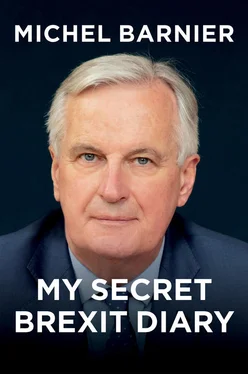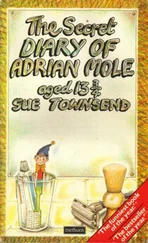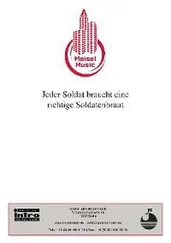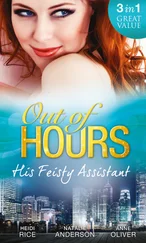‘Ma’am, may I ask, how you would say in English “ Vive l’Entente cordiale ”?’
‘You would say “Long live the Entente Cordiale”’, the Queen immediately replied.
With this very special lesson in English under my belt, I repeated the phrase a few minutes later before the Chamber, looking out at the British MPs – somewhat to the surprise of some French MPs and journalists, many of whom thought that I had made a mistake and that the correct phrase should have been ‘Long life to the Entente Cordiale’.
This episode was even reported in the humour magazine Le Canard enchaîné , which mistakenly mocked the foreign minister for his poor English.
But I never could have dreamt of having such an eminent teacher…
This meeting with journalists is an important moment, an opportunity to set the record straight, given the amount of ‘fake news’ that Brexit is provoking.
Today’s speech gives me the opportunity to let everyone know my state of mind: neither aggression, nor naivety, nor revenge. I want to remain calm in all circumstances. And Georg has devised a nice phrase that will do the rounds of the news channels: ‘Keep calm and negotiate.’ A nice invitation to the negotiating table, and a little jab at the British… Stefaan De Rynck will later get a bright red mug made for me emblazoned with the slogan, which I will keep prominently on my desk.
This press conference is also an occasion for me to play teacher, explaining the difference between withdrawal – the terms of which must be set out within a two-year period – and our future relationship – which will no doubt take longer to negotiate.
Finally, I use it as an opportunity to draw attention to the countless consequences of Brexit: human, social, economic and financial, technical and legal. And to list the main issues that we will need to work on in the run-up to withdrawal: the rights of European citizens in the UK and of British citizens in the EU; settlement of the financial commitments made by the UK to the Union as a member state; and the future of the Union’s new borders, particularly in Ireland.
I then head to the European Parliament to meet with the presidents of the political groups, after having spoken yesterday with President Martin Schulz and set out the inter-institutional working method I want to put in place. Schulz, always very European and direct, assured me of his trust. Around the table today I find other parliamentarians I have known for a long time: Guy Verhofstadt, Manfred Weber, Gianni Pittella, Philippe Lamberts, Gabriele Zimmer, Danuta Hübner…
They give me a warm and friendly welcome. They all know how much importance I attach to the work of the European Parliament, having always been convinced, in all my previous roles, that it has a crucial part to play in the balance of the institutions.
This is all the more true in the context of these negotiations, since it will be up to the European Parliament to ratify the Withdrawal Agreement. We are all fully aware of the political balance that must be maintained, and we agree to meet regularly to collaborate on refining the positions that it will be my job to put forward and defend.
Thursday, 22 December 2016: Grounded planes?
The Directorate-General for Transport sends me a memo on the impact of Brexit upon the various sectors it covers, should we fail to reach a deal with the UK.
The observations are extremely worrying, particularly as far as the aviation sector is concerned. In this domain the memo predicts an immediate and serious deterioration in traffic between the UK and the Continent; from a legal point of view, the absence of an agreement would be tantamount to a return to the pre-1992 situation when there were only bilateral agreements between the UK and individual member states.
The ability that a British company such as EasyJet enjoys under current EU rules to charter flights between France and Germany, for example, would end overnight. The entire aviation safety regime in force in the UK – currently maintained by the European Union Aviation Safety Agency – would also be called into question. Once again, I am reminded of the incredible complexity of the agreement we have to negotiate and the multiplicity of subjects it covers.
1 *So called in reference to Article 50 of the Treaty on European Union, which provides for the withdrawal of a member state.
Конец ознакомительного фрагмента.
Текст предоставлен ООО «ЛитРес».
Прочитайте эту книгу целиком, купив полную легальную версию на ЛитРес.
Безопасно оплатить книгу можно банковской картой Visa, MasterCard, Maestro, со счета мобильного телефона, с платежного терминала, в салоне МТС или Связной, через PayPal, WebMoney, Яндекс.Деньги, QIWI Кошелек, бонусными картами или другим удобным Вам способом.












